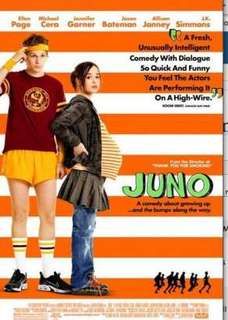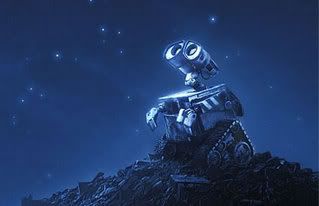Movie Analysis: Juno verses Wall-E
By Kathleen Bolton | July 9, 2008 |
 Last week I blogged about seeing Lars and the Real Girl instead of my intended movie pick for the weekend, Juno. Maybe I’d been tainted by too much publicity about the preggers teen with the acerbic wit and potty mouth, but I took a pass and was glad I’d spent the evening with Lars and his kooky problem.
Last week I blogged about seeing Lars and the Real Girl instead of my intended movie pick for the weekend, Juno. Maybe I’d been tainted by too much publicity about the preggers teen with the acerbic wit and potty mouth, but I took a pass and was glad I’d spent the evening with Lars and his kooky problem.
Welp, Netflix came through and I finally saw Juno last night. And it was . . . meh. More than meh. I fast-forwarded through the middle ’cause I started really not liking the characters much. Make that Juno. She’d worn out my nerves right around her first trimester.
I tried to keep an open mind. Really. Diablo Cody won an Oscar for best original screenplay, so I was ready for good dialogue and interesting situations.
By about the end of Act 1, I’d had enough of lines that kept slamming me in the face with ‘edgy insightfullness.’ “Look,” Cody seemed to be saying, “Isn’t Juno current and raw and vulnerable all at once? Isn’t she? Isn’t she? She says ‘dude’ and ‘holmes’ while talking about philosophy. She’s a high-school Moliere.” Each line of dialogue felt like a standup bit from Second City. Bada-bing.
Juno goes overtime in trying to milk irony and turn it into a genuine emotional moment. The overly precious soundtrack, Juno’s self-consciously grungy town juxtaposed against the stepfordish Glacial Estates where the adoptive parents live—gah! Enough, I get it. Juno’s Quirky with a capital Q. Now shut UP.
On the other end of the spectrum, I took my kid to see Wall-E over the weekend.
 For a movie that has basically no dialogue, I was riveted from start to finish, found myself rooting for Wall-E, a beat up robot left behind to clean up the filth of all humanity, and really really cared about his happy ending. Leave it to Pixar to once again develop a story that you think has no chance of being interesting at all, but manages to be gripping, deep and suitable for all ages. The philosophical implications in Wall-E slam much harder than they do in Juno because they unfold organically. In Wall-E, I don’t have to endure a scene where two characters talk about the gluttony of humans, which is responsible for the apocalypse (instead of nukes or world wars–talk about irony). All I have to do is look at the garbage-strewn landscape. Wall-E, the trash-compacting robot, picks through the detritus for those few treasures that reveal both the best and worst of humanity. So now I’m watching a kid’s movie that makes me think about the nature of creation, our place in the universe, deep-seated love, and hope. And how good the musical Hello, Dolly! was.
For a movie that has basically no dialogue, I was riveted from start to finish, found myself rooting for Wall-E, a beat up robot left behind to clean up the filth of all humanity, and really really cared about his happy ending. Leave it to Pixar to once again develop a story that you think has no chance of being interesting at all, but manages to be gripping, deep and suitable for all ages. The philosophical implications in Wall-E slam much harder than they do in Juno because they unfold organically. In Wall-E, I don’t have to endure a scene where two characters talk about the gluttony of humans, which is responsible for the apocalypse (instead of nukes or world wars–talk about irony). All I have to do is look at the garbage-strewn landscape. Wall-E, the trash-compacting robot, picks through the detritus for those few treasures that reveal both the best and worst of humanity. So now I’m watching a kid’s movie that makes me think about the nature of creation, our place in the universe, deep-seated love, and hope. And how good the musical Hello, Dolly! was.
And I swear there’s only about 17 lines of dialogue in the whole thing.
The lesson is that wiseassing takes a writer only so far. Much more important is concentrating on moments of genuine emotion, getting out of the way of the character (s), and keeping the dialogue natural. Then the experience feels more like storytelling and less like a night at a Comedy Club.









I am always amazed when movies become Academy Award winners and then you see it and it’s like, why did everyone think this was so great? I haven’t seen Juno, and I think I have been avoiding it for the same reasons you listed in your post. She just seemed like a girl who would annoy me. Not saying I’ll never watch it because I’m sure I will. I felt the same way about Little Miss Sunshine. They made such a huge deal over the movie, and to me it was nothing special.
There’s a reason why mass market blockbusters don’t tend to be the movies that are given Academy Awards. Blockbusters try to be something that everyone can enjoy and be entertained by, whereas the ‘deeper’ movies like academy award nominees try to resonate strongly with a subsection of the population. While you may not have liked Juno, others obviously saw it and thought, “Wow, what great writing!” There are few summer action flicks where people say that.
Pixar is so revered because not only do they provide quality animation, but because they are capable of entertaining a wide audience (both adults and kids). While their movies are entertaining, they likely won’t get any Best Picture nominations. In their quest to appeal to a wide audience, they lose the ability to bring up serious, thought-provoking issues — something that academy voters seem obsessed about. That said, Wall-E was an impressive movie, because they managed to bring up such issues in a G-rated film without ostracizing their audience (or even using much dialogue!)
Now, is it just me, or does this entire discussion serve as a great analogy between books that sell well and those that are critically acclaimed?
Juno’s witticisms as a character are a defense mechanism for her deeper vulnerability.
Thus, I was able to get past the smart-assing and enjoy the movie.
Every teenager thinks they’re smarter than their parents, and smarter than everyone else. I knew everything when I was 18, was cocky about it, and the painful memory of that time period — the reality of how little I actually knew — has stayed with me.
I think if you watch the film with that in mind, it’s a much different experience.
Chro, it is a great analogy and sounds like a blog post in and of itself. It also ties in with Juliet’s post on genre v literary fiction.
Kath, thanks for the post. All the critics are raving about Wall-E, saying it’s Pixar’s best flick to date. Sounds like a good summer pic for the kids.
I hated Juno! So glad to hear someone else say it. I watched it with my 13-year-old daughter who BEGGED me to see it and even though she’s seen worse, I was squirming the whole time over how ho-hum everyone was about the teenaged pregnancy. And Juno’s borderline inappropriate relationship with the adoptive father just skeeved me out. I agree that Cody was striving for a big NOTICE ME kind of statement that fell flat for me. Although I did love Allison Janney, who is terrific in everything she does. And I agree with the other commenter who said the Academy Award-winning movies tend to be the least enjoyable movies for me.
I’m standing by my love of Juno, which I found warm and rich and all about the ordinary, simple, profound things that make our lives livable or not. It worked for me because of the touching relationship between Juno and her boyfriend. There were great romances in that movie and they weren’t tidy or ordinary.
But my son just insisted I go see WALL-E, too, and I’m sure I’ll do that this week.
Also, on your recommendation, I rented Lars and the Real Girl and it was absolutely wonderful. Funny. Strange. Beautiful, and a tribute to community in a way that moved me very deeply. Thanks.
I have to say that I loved Juno. Maybe it’s because as a secondary school teacher I have met a lot of kids trying to prove how adult they are by smart alec remarks and over the top ‘cool’ behaviour. I loved the tender romance with the boyfriend and how it developed and found the whole moving both warm and funny. For once in a movie about teen pregnancy it wasn’t the teenager throwing her life and that of her unborn child away to end up in the single parent trap of poverty and downward spiral but a young woman taking positive steps to resolve the situation she had created for everyone’s sake.
I sort of liked Juno. But what I really disliked about it was the music track. It was so annoying. I really believe that it would have been a better movie without all the quirky lyric banjo-ie music. This is why it didn’t get an oscar nod for music. But in terms of the story, it was interesting. The dialogue was so beyond a 15 year old, and probably not very realistic. But Kathleen, I do appreciate your reaction to it.
I *loved* the dialog in Juno. Totally not “natural”, but wonderful none-the-less. It reminded of some of the old classic movies like Thin Man and was wonderful to listen too.
Wall-E actually had dialog through out the entire movie. It’s just that much of it wasn’t spoken. Hats off to the Pixar team for making bleeps and bloops convey as much as words.
I had an easier time with the smart-ass high school student than I did the love-sick robot. Although I enjoyed Wall-E it was a bit too “Hallmark moment” for me (and I enjoyed 27 Dresses).
Thea, yes! I watched Juno for this first time this week and while I loved the movie, the music almost made us turn it off. My husband kept saying teenagers don’t really talk like that, but I’d already heard that complaint and was mentally prepared. I’ll watch it again, but I might mute the musical interludes.
Finally! Someone who agrees with me regarding Juno! I really disliked that movie, so I never understood why people praised it so much (including my “hero” Roger Ebert).
And about Wall-E… well… I don’t like these animation movies. For me it’s only 2D movies like the classics Lion King, Beauty and the Beast, and so on. :(
Thanks, everyone, for chiming in (sorry for the silence, I’ve been away). It’s always fun to see how many different opinions there are about one movie (or book).
I didn’t mention the skeevy relationship with the adoptive father in the original blog because that’s where I started fast-forwarding. I love Jason Bateman but this performance didn’t do it for me.
Ellen Page is great in Juno. And she’s really pretty. Really. Pretty.